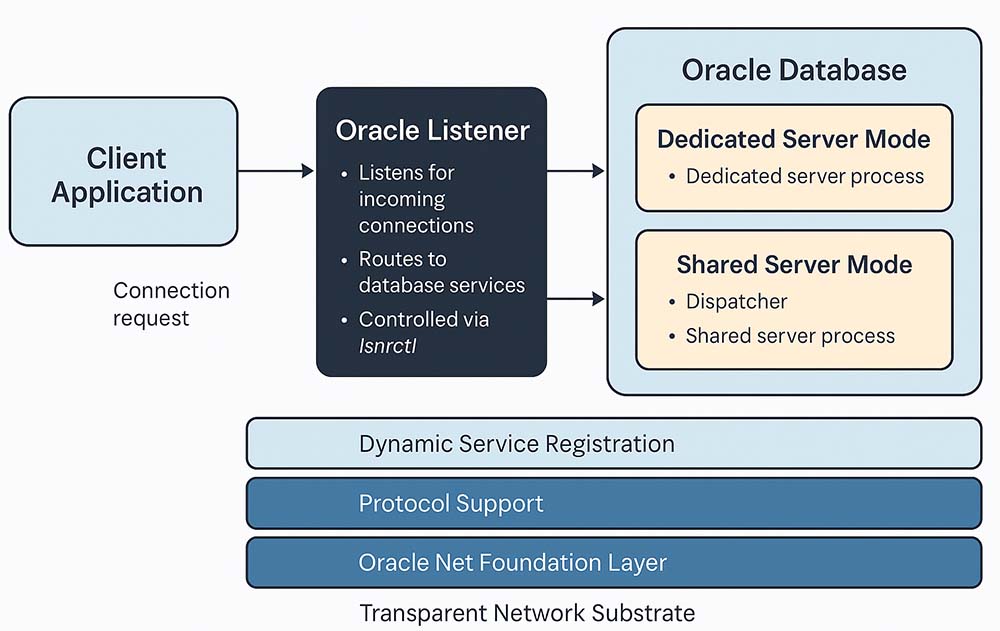| Lesson 3 | The Oracle Listener |
| Objective | Explain how the listener manages incoming client connections |
Understanding the Oracle Listener
The Oracle Listener is a background process responsible for managing incoming connection requests from client applications. It listens on a specified network interface and port, accepts connections using industry-standard protocols (primarily TCP/IP), and forwards valid requests to the appropriate Oracle database service.
The listener runs independently of the database instance and plays a critical role in ensuring high availability, scalability, and security in both on-premise (Oracle 11g R2) and cloud-based (Oracle 23c / 23ai) deployments.
Listener Types and Connection Handling
- Dedicated Server Mode: The listener creates a dedicated server process for each incoming client connection. This model is ideal for applications that maintain persistent sessions or require dedicated memory and resources.
- Shared Server Mode: Multiple clients share a pool of dispatcher and shared server processes, reducing memory usage and scaling better for environments with large numbers of simultaneous users. This configuration is typically used when resource optimization is a priority.

Dynamic Service Registration
Modern Oracle configurations (starting with Oracle 10g and continuing through Oracle 23ai) allow dynamic registration of database services. The database instance automatically registers itself with the listener using the Local Listener parameter and Service Names defined in the database initialization file.
This eliminates the need to statically define services in listener.ora, simplifying listener management and reducing administrative overhead.
Listener Configuration Scenarios
- Single Listener, Multiple Databases: A single listener handles connection requests for multiple database instances on the same server.
- Multiple Listeners: Used for separation of traffic, different ports or network interfaces, or protocol isolation in secure environments.
- Autonomous Database (Oracle 23ai): In cloud environments, the listener is managed automatically by the Oracle Cloud Infrastructure (OCI). You configure connectivity through the console or using Terraform-based infrastructure-as-code tools.
Listener Behavior and Lifecycle
lsnrctl start: Start the listener processlsnrctl status: Display current listener configuration and registered serviceslsnrctl stop: Gracefully shut down the listener
Once a connection is successfully established, the listener disconnects from the session and hands off the connection to the database's server process. This design ensures the listener remains free to accept new requests without getting tied to ongoing sessions.
Modern Best Practices
- Avoid hardcoding services in
listener.ora; rely on dynamic registration whenever possible. - Secure the listener using password protection and TLS-based encryption in production environments.
- Enable logging and tracing for diagnostics via
listener.logandlistener.trcfiles. - Use dedicated listeners for high-security or high-throughput workloads.
- Monitor listener performance using Oracle Enterprise Manager or OCI tools.
The next lesson covers how to configure the listener step-by-step using both listener.ora and dynamic registration parameters.